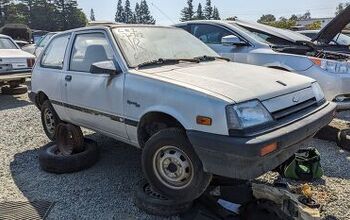Trade War Watch: China to Temporarily Suspend U.S. Auto Tariffs

China announced Friday its intent to reduce tariffs on imports of American-made cars as it tries to negotiate a trade deal with the United States. As you’ll recall, the People’s Republic imposed additional punitive tariffs on U.S. cars and auto parts earlier this year after promising it would lower the trade barriers on a global scale.
Things look to be different this time around. China has already taken steps to scale back the trade war and appears ready to continue down that path. Earlier this month, President Donald Trump and Chinese President Xi Jinping agreed to a truce in the trade war at their meeting in Argentina. This was followed by an announcement, via Trump’s Twitter account, claiming China had agreed to scale back auto tariffs against the United States.
It took a while, but the Chinese Finance Ministry has now confirmed that claim, saying it will remove the additional 25 percent tariff on car imports from the United States for three months starting January 1st. During the 90-day period, the two nations will attempt to negotiate a “mutually beneficial new Sino-US trade order.”
There are reasons to remain skeptical. Trump has taken a tough stance on trade, trying to bully China away from protectionist practices that see the United States losing ground. Meanwhile, Xi pledged China would cut car tariffs last spring. While the nation delivered on its promise in July, reducing foreign automotive duties from 25 percent to 15, American-made passenger vehicles were hit with an additional 25-percent retaliatory tariff just a few days later — negatively impacting the profits of major automakers that ship cars to China from the United States.
According to Bloomberg, both Washington and Beijing are unconvinced as to whether or not China is willing to water down its plans to match and exceed U.S. industrial might. The trade war has hurt both countries, but neither wants to come out looking like the loser.
From Bloomberg:
China’s top leaders are expected to meet next week to decide economic policies for 2019. Their focus will be on how they propose to sustain stable growth when faced with both uncertainty from the trade war and from the slowing domestic economy.
The temporary tax reduction for U.S. car imports comes as China heads for its very first annual vehicle sales decline in 28 years amid the trade war and an economic slowdown that’s undermining consumption momentum.
Car sales in China have fallen for six straight months after decades of almost uninterrupted growth. While there were other factors, the tit-for-tat jabs between the world’s biggest economies have played a role. The move by China would reduce tariffs on cars made in the U.S. to 15 percent from the current 40 percent, in line with what other countries pay.
Meanwhile, the value of U.S. passenger car exports to China has fallen by roughly $2.4 billion (about 30 percent) through the first nine months of 2018. But not all manufacturers were affected equally. General Motors and a handful of other automakers already have a large presence in China via partnerships with local companies, but brands like Daimler and BMW took a beating after deciding to build their high-volume exports in the United States.

A staunch consumer advocate tracking industry trends and regulation. Before joining TTAC, Matt spent a decade working for marketing and research firms based in NYC. Clients included several of the world’s largest automakers, global tire brands, and aftermarket part suppliers. Dissatisfied with the corporate world and resentful of having to wear suits everyday, he pivoted to writing about cars. Since then, that man has become an ardent supporter of the right-to-repair movement, been interviewed on the auto industry by national radio broadcasts, driven more rental cars than anyone ever should, participated in amateur rallying events, and received the requisite minimum training as sanctioned by the SCCA. Handy with a wrench, Matt grew up surrounded by Detroit auto workers and managed to get a pizza delivery job before he was legally eligible. He later found himself driving box trucks through Manhattan, guaranteeing future sympathy for actual truckers. He continues to conduct research pertaining to the automotive sector as an independent contractor and has since moved back to his native Michigan, closer to where the cars are born. A contrarian, Matt claims to prefer understeer — stating that front and all-wheel drive vehicles cater best to his driving style.
More by Matt Posky
Latest Car Reviews
Read moreLatest Product Reviews
Read moreRecent Comments
- TheEndlessEnigma Looking pretty dirty and worn inside for only 11,000 miles.
- Add Lightness ...and I thought the Trump Towers were excessively pretentious.
- Daniel Tons of discounts out there on the eGMP's, just pick your style: Ionic 5/6, Kia EV6 and Genesis GV60. Personally, I got $20k off on a $60k MSRP GT-Line EV6 (only $7500 of that was a "rebate" from the state, the rest was Kia and dealer discounts). They are not only the same platform, but nearly identical mechanically other than slightly adjusted wheelbases. Find this one ugly? Look at Ionic 5 or EV6 instead, it's actually pretty cool how they came up with 4 distinct styles with basically the same car to fit many different tastes.
- Dave Holzman EVs will be ready for prime time when the chargers are dependable, and easy to use, when they can fill the battery in around 10-15 minutes, when there are sufficient numbers of them that people don't have to hang out for a half an hour waiting for a fast charger to be free, when chargers are widely available even in Nebraska, Wyoming, eastern Oregon, Nevada, Utah, the northern parts of Maine, New Hampshire, and Vermont, and within 10 miles of the start of the Tail of the Dragon, and when they get fixed pronto when they have problems.
- MaintenanceCosts The Supercharger network is something with much more growth potential than their actual car building operations, which has been marvelously run to this point and has a years-long head start on all its competitors, and Elon lays the whole team off?I don't know if it's distraction or the drugs, but he is not making good decisions and should not be CEO anymore.


































Comments
Join the conversation
The trade issue needs to be confronted. The Chinese shrugged off the pathetic rhetoric of previous administrations. I think the US finally has a president who was able to get China's attention. Even the spineless EU is leading from behind and making bleating noises now that they have seen US resolve. No one can predict the outcome, but it is about time a president took the China trade issue seriously. Their actions have caused massive damage and the policymakers have been too blind, fearful or corrupt to do anything meaningful about it. We never should have agreed to allow this dictatorship into the WTO.
Geez ... Am I the only American who thinks the tariffs/import restrictions are trivial compared to the IP theft/hacking/spying the Chinese are doing? I really don't care if Harbor Freight tools go up 10%; the Chinese are stealing our technology and R&D and will likely be using it against us in a naval confrontation in the not-too-distant future (of no small concern to me as my son is in Navy OCS studying Surface Warfare). Saying I don't think much of Trump is a major understatement, but he gets credit for confronting the Chinese, no matter how clumsily. Since he doesn't like to read or study and doesn't seem to understand nuance I hope he or his minions are up to confronting China on their outright theft of our prosperity.